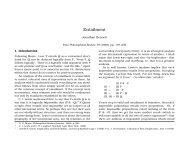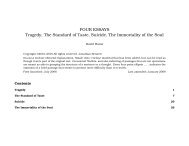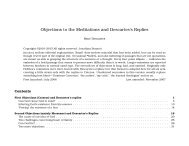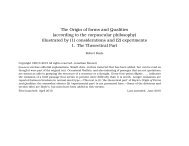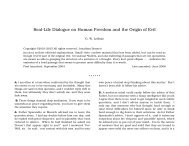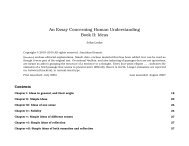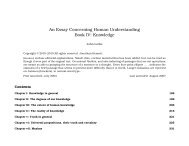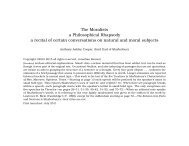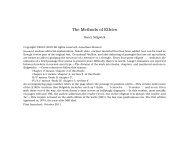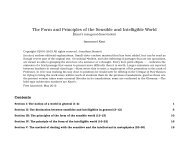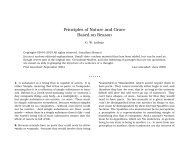A Vindication of the Rights of Woman with - Early Modern Texts
A Vindication of the Rights of Woman with - Early Modern Texts
A Vindication of the Rights of Woman with - Early Modern Texts
Create successful ePaper yourself
Turn your PDF publications into a flip-book with our unique Google optimized e-Paper software.
The <strong>Rights</strong> <strong>of</strong> <strong>Woman</strong> Mary Wollstonecraft 2: Current views about sexual differences<br />
We aren’t told how women are to exist in a state <strong>of</strong> affairs<br />
where <strong>the</strong>re is no marriage. Moralists have agreed that <strong>the</strong><br />
tenor <strong>of</strong> life seems to prove that man is prepared by various<br />
circumstances for a future state, but <strong>the</strong>y are unanimous in<br />
advising woman to provide only for <strong>the</strong> present. Gentleness,<br />
docility [see Glossary], and spaniel-like affection are consistently<br />
recommended as <strong>the</strong> cardinal virtues <strong>of</strong> <strong>the</strong> sex; and<br />
one writer. . . .has declared that it is ‘masculine’ for a woman<br />
to be sad. She was created to be <strong>the</strong> man’s toy, his rattle,<br />
and it must jingle in his ears whenever he dismisses reason<br />
and chooses to be amused.<br />
It is absolutely correct to recommend gentleness in a<br />
general way. A frail being—·and all humans are frail·—<br />
should try to be gentle. But when forbearance confuses<br />
right <strong>with</strong> wrong, it stops being a virtue. It may be found<br />
agreeable in a companion, but that companion will always be<br />
regarded as an inferior, and will inspire only a flat and lifeless<br />
tenderness which easily degenerates into contempt. Still, if<br />
advice really could make gentle a being to whom such a fine<br />
polish isn’t natural, that would move things on a little in <strong>the</strong><br />
direction <strong>of</strong> true morality; but it’s easy to show that what<br />
such advice actually produces is affectation, pretence, which<br />
puts a stumbling block in <strong>the</strong> way <strong>of</strong> personal improvement,<br />
so that <strong>the</strong> ·female· sex gets little benefit from sacrificing<br />
solid virtues to <strong>the</strong> acquiring <strong>of</strong> superficial graces, even if for<br />
a few years <strong>the</strong>se graces give <strong>the</strong> individual a great deal <strong>of</strong><br />
power.<br />
As a philosopher, I read <strong>with</strong> indignation <strong>the</strong> nicesounding<br />
descriptions that men use to s<strong>of</strong>ten <strong>the</strong>ir insults;<br />
and as a moralist, I ask what <strong>the</strong>y mean by such oxymorons<br />
as ‘fair defects’, ‘amiable weaknesses’ and so on. [In Paradise<br />
Lost Eve is called a ‘fair defect’.] If <strong>the</strong>re is only one criterion <strong>of</strong><br />
morals for men, only one model for <strong>the</strong>m to follow, women<br />
seem to be suspended by destiny. . . .: <strong>the</strong>y don’t have <strong>the</strong><br />
23<br />
unerring instinct <strong>of</strong> <strong>the</strong> lower animals, but nor are <strong>the</strong>y<br />
allowed to fix <strong>the</strong> eye <strong>of</strong> reason on a perfect model. They<br />
were made to be loved, and must not aim at respect, lest<br />
<strong>the</strong>y should be hunted out <strong>of</strong> society as ‘masculine’.<br />
Look at this topic now from a different angle. Do passive<br />
idle women make <strong>the</strong> best wives? ·Never mind <strong>the</strong> after-life<br />
just now·; let us confine our discussion to <strong>the</strong> present<br />
moment <strong>of</strong> existence, and ask: How well do such weak<br />
creatures perform <strong>the</strong>ir part? Do <strong>the</strong> women who by attaining<br />
a few superficial accomplishments have streng<strong>the</strong>ned<br />
<strong>the</strong> common prejudice ·regarding women· contribute only<br />
to <strong>the</strong> happiness <strong>of</strong> •<strong>the</strong>ir husbands? Do <strong>the</strong>y display <strong>the</strong>ir<br />
charms merely to entertain benbul<strong>the</strong>m? And do women<br />
who were brought up on notions <strong>of</strong> passive obedience have<br />
enough character to manage a family or educate children?<br />
So far from it that after surveying <strong>the</strong> history <strong>of</strong> woman I<br />
can’t help agreeing <strong>with</strong> <strong>the</strong> severest satirist who regards <strong>the</strong><br />
·female· sex as <strong>the</strong> weaker as well as <strong>the</strong> more oppressed<br />
half <strong>of</strong> <strong>the</strong> species. What does history reveal except marks<br />
<strong>of</strong> inferiority? How many women have freed <strong>the</strong>mselves<br />
from <strong>the</strong> humiliating yoke <strong>of</strong> sovereign man? So few that<br />
<strong>the</strong> exceptions remind me <strong>of</strong> <strong>the</strong> ingenious conjecture that<br />
Newton was probably a being <strong>of</strong> a superior order, accidentally<br />
caged in a human body! Following that line <strong>of</strong> thought I have<br />
been led to imagine that <strong>the</strong> few extraordinary women who<br />
have rushed in various directions out <strong>of</strong> <strong>the</strong> orbit prescribed<br />
to <strong>the</strong>ir sex were male •spirits confined by mistake in a<br />
female body. But if it isn’t philosophical to think <strong>of</strong> sex<br />
when <strong>the</strong> •soul is mentioned, <strong>the</strong> inferiority ·<strong>of</strong> women· must<br />
depend on <strong>the</strong> organs, or else <strong>the</strong> heavenly fire that makes<br />
<strong>the</strong> clay develop isn’t distributed in equal portions.<br />
I am continuing to avoid any direct comparison between<br />
<strong>the</strong> two sexes collectively; I do frankly acknowledge <strong>the</strong><br />
inferiority <strong>of</strong> woman according to <strong>the</strong> present appearance <strong>of</strong>



